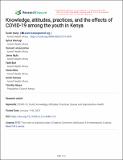Knowledge, Attitudes, Practices, and the Effects of COVID-19 Among the Youth in Kenya
View/
Publication Date
2021-01-11Type
Article, Journalviews
downloads
Metadata
Show full item recordCitation
Karijo E, Wamugi S, Lemanyishoe S, Njuki J, Boit F, Kibui V, Karanja S, Abuya T. Knowledge, attitudes, practices, and the effects of COVID-19 among the youth in Kenya. BMC Public Health. 2021 May 30;21(1):1020. doi: 10.1186/s12889-021-11067-2. PMID: 34053442; PMCID: PMC8164891.
Abstract/
Background: Cases of the Corona Virus Disease of 2019 (COVID-19) in Kenya have continued to increase rapidly, since the first case in the country was confirmed in March 2020. In the wake of the pandemic, the health and socio-economic challenges experienced by the youth in Kenya are likely to be elevated. We assessed knowledge, practices, perceived risk, adoption of recommended behaviour and the effects of COVID-19 among the youth in Kenya. Methods: A cross sectional descriptive study was conducted between April 30th to May 7th, 2020 through a combined online survey and phone interviews. A total of 2,156 youth across all 47 counties in Kenya completed the responses to the study questions. All survey responses analyzed using STATA v15 were tabulated by gender, age, and education level to generate basic descriptive tables and tested for differences by category using chi-square tests. Where applicable, linear and logistic regression analysis model was conducted using covariates such as employment status, gender, and education level. Results: Knowledge on symptoms of COVID-19 was generally high. Female respondents were more likely to identify more symptoms correctly compared to men; p<0.001. However, youth reported very low levels of anyone being at risk of infection (7%). Most youth have adopted behavior necessary to slow down the infection. There were generally very low reported levels of inability to access health services related to sexual and reproductive health. About 50% of respondents reported significant decline in income during the pandemic period, nearly a third reported living in fear while 27% reported feeling stressed. Conclusion: There was high knowledge of COVID-19 symptoms, preventive strategies, and high adoption of preventive practices. Strategies to sustain behaviors positively adopted among young people will be critical to reduce the spread of COVID-19. Despite low reported rates of inability to access sexual and reproductive health, response measures should include strategies that facilitate continuity of services among young people. The reported social effects of the pandemic show the need for interventions to meet the health and socioeconomic needs of the youth and minimize the long-term consequences of the pandemic.
Further Details
This work is licensed under a Creative Commons Attribution 4.0 International License. Read Full License
Publisher
Research SquareCollections
- General - GEN [367]

